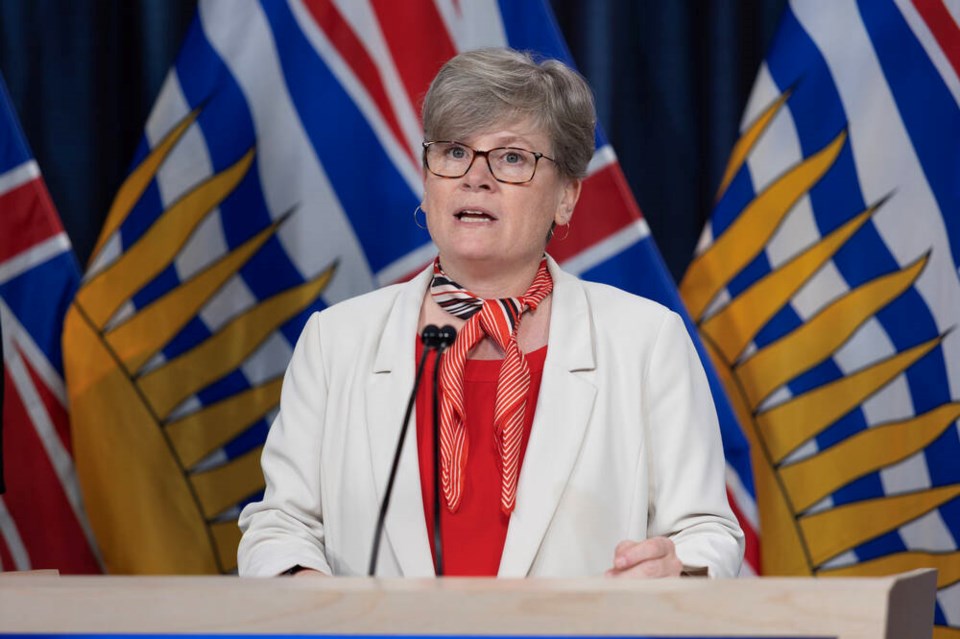B.C.’s first attempt at cutting costs inside a health authority is proving to be a bewildering affair, with news that the $400,000 boss brought in to oversee the exercise will not produce a written report, has no deadline for the work and was given no target for savings.
Health Minister Josie Osborne made the admissions to the legislature while getting grilled by Opposition critics during her budget estimates. Although she promised that Dr. Penny Ballem would give an initial set of recommendations on efficiencies inside the Provincial Health Services Authority within six weeks, Osborne balked at calls from Opposition critic Claire Rattée to release that work to the public.
“I am expecting and have requested a report on the progress in six weeks,” said Osborne.
“This isn't a form of a formal written report. So it's not something that I intend to release publicly.”
Osborne cited “cabinet confidences to be respected” as part of the rationale for keeping it secret. Plus the fact, apparently, Ballem’s recommendations may not even be written down.
Osborne fired the PHSA board March 31, moved its CEO into her ministry and installed Dr. Ballem as head of the agency to oversee an administrative review and cost-cutting exercise.
The move drew immediate criticism, both for Ballem’s high salary, her history as a senior official setting the health-care policies she’s now reviewing, and her $1.4 million in consulting fees billed to the government over the last four years.
The PHSA review is the first of what Premier David Eby promised during the election campaign would be efficiency reviews in all B.C. health authorities to respond to criticism that frontline health funding is being wasted on a proliferation of managers and executives.
However, there are no terms of reference, dates or targets. Instead, Osborne told the legislature about vague “iterative cycles” of progress.
“The review will focus on administrative structures, on roles and responsibilities, on opportunities to meet the requirement to ensure that the maximum amount and the best use of the resources that are available are being applied to frontline care for British Columbians,” she said.
“We expect this review to be undertaken in a series of iterative cycles, and as progress is made, there’ll be an opportunity for me and for government to provide those progress reports.
“There is not a set time on the specific end of this because, again, the work has just gotten underway.”
Rattée asked if Ballem would produce a final report in her role as “interim” PHSA CEO, which comes with a $400,000 annual salary.
“If we’re contracting somebody to do this work, I would assume that there’d be a timeline on it,” said Rattée.
No, said Osborne.
“There is not a specific time schedule for the end of the review,” said the minister. “That is because the team needs to get in and begin the review process. They’re going to go through a series of iterative cycles.”
How long, then, will Ballem be “interim” CEO, Rattée asked. Osborne had no answer.
Meanwhile, inside the PHSA, one of Ballem’s first moves has been to implement a hiring freeze inside the agency, which controls BC Cancer, BC Children’s Hospital, the B.C. Ambulance Service and the BC Centre for Disease Control.
“We simply cannot get where we need to be — within PHSA or across the health system — without making hard decisions,” Ballem wrote in a notice to staff.
“While the focus of the review is on administrative costs, we will also be looking wherever possible for efficiencies, questioning the status quo, and finding smarter ways to organize and deliver our services so that we can continue to meet the increasingly complex health-care needs of the more than 5.5 million residents of B.C., even in challenging times.”
All “non-contract hiring exemptions” for PHSA agencies must now be approved by Ballem directly, read her note, dated April 3.
That was followed the next day by an email from PHSA vice-president Sean Virani who clarified “the hiring freeze also applies to non-contract physician and NP [nurse practitioner] roles.”
The freeze is confusing when put in the context of persistent health-care staff shortages, as well as attempts by agencies like the ambulance service or BC Cancer to recruit staff to reduce wait times.
In a statement, Ballem sought to clarify the clarification, stating the hiring freeze does not impact frontline doctors and nurses and is focused on “non-contract/non-union roles.”
“This includes vacancies for roles that are currently funded as well as hiring into any new positions in areas not delivering critical patient services,” she wrote in a statement.
“Physicians and nurses and other care-providing staff often hold full-time or part-time leadership or administrative roles. The freeze will apply to administrative and leadership roles, and not to roles involving delivery of critical services directly to patients.”
Osborne told the media the freeze “was an important first step in her review.”
“This will not impact the delivery of frontline services,” said Osborne.
But it’s hard to see where all this is going. A very expensive review, with no terms, targets, dates or public reporting, sounds like a disaster in the making. At the very least, it’s not what the public thought they were getting when the premier promised to look for savings inside health authorities.
Rob Shaw has spent more than 17 years covering B.C. politics, now reporting for CHEK News and writing for Glacier Media. He is the co-author of the national bestselling book A Matter of Confidence, host of the weekly podcast Political Capital, and a regular guest on CBC Radio.
🚨New newsletter alert! Stay ahead of the curve in B.C. politics. Get expert political analysis delivered straight to your inbox, plus inside scoops and other stories from across the province.





